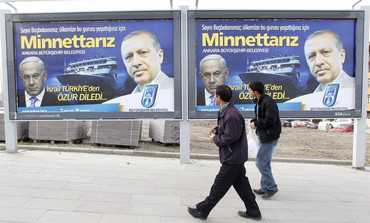Turkey and Armenia missed an historic opportunity to improve ties when Turkey refused to ratify the Protocols on the Establishment of Diplomatic and Bilateral Relations signed on October 10, 2009. Rather than rapprochement, Armenians are now fully mobilized to organize worldwide activities commemorating the one hundred year anniversary of the Armenian Genocide on April 24, 2015. Armenia would never sacrifice gaining greater global recognition of genocide for cross-border cooperation with Turks. However, trade can still play a helpful role reducing tensions and creating positive momentum in Turkish-Armenian relations.
More than a closed border, Turks and Armenians are divided by different perceptions of history. More than one million Armenians perished during the final years of the Ottoman Empire between 1915 and 1923. Turkey disputes these facts, referring to the events as “shared suffering.” Turkey demands a joint historical commission to address the “Armenian question.” The political impasse between Turkey and Armenia is compounded by Ankara’s linking of relations with Armenia to resolution of the conflict in Nagorno-Karabakh where Armenians and Azerbaijanis fought a brutal war displacing 600,000 people in the early 1990s.
The governments of Turkey and Armenia may be at loggerheads, but Turks and Armenians are still engaging in economic diplomacy, working on cross-border activities beneath the radar. Commercial contact involves mostly “suitcase trade” involving consumer goods transported from Turkey through Georgia to Armenia.
But bigger business is possible. Armenia could sell surplus electricity to Turkey which needs energy to power its economic boom. Armenia could also tap into Turkey’s state-of-the-art fiber optic cable to meet its growing demand for Internet. Railway service between Kars in Turkey and Gyumri in Armenia could resume when Turkey opens its border gate. In anticipation, Armenia could begin conforming the country’s Soviet-era railway gauge to Turkish and European standards.
In addition, Qualifying Industrial Zone (QIZ) could be established to catalyze joint enterprises between Turks and Armenians. A QIZ is an industrial park and a free-trade zone, which is linked to a free-trade agreement with the United States. Goods qualify when partners contribute raw material, labor, or manufacturing. Kazan, an area in Armenia on the Turkish border, would be a suitable destination for joint ventures in textile and piece goods manufacturing.
The QIZ should proceed with steps to relax restrictions on the surface transport of commercial goods. Armenian trucks are allowed to use Turkey as a transit country, but can’t off-load on Turkish soil. The same holds true for Turkish trucks transiting through Armenia. Trucks should be allowed to transfer goods destined for markets in the neighboring countries, with Turkey and Armenia identified as destinations in the export registry.
Normalized travel and trade would also stimulate the tourist industry. Many Armenians are coming from Russia to cultural sites in Eastern Turkey. Allowing Armenian tourist buses to cross the Turkish-Armenian border would be a windfall for local business. Charter flights between the eastern Turkish city of Van and Yerevan would enhance commercial contact and a Turkish Airlines office in Yerevan would boost travel. The Ani Bridge across the Akhurian River, which symbolized the connection between Armenian civilization and the Anatolian plain, should be restored.
A useful database is being prepared by the Turkish-Armenian Business Development Council profiling opportunities and connecting potential business partners. Linkages could also be established between local chambers of commerce and mayors with the goal of establishing sister-city relationships and fostering trade and investment.
Such civil society and private sector initiatives have intrinsic value. Moreover, they can also incentivize official diplomacy or serve as a safety net when diplomacy stalls. They are not, however, a substitute for official diplomacy.
There is currently no contact between Turkish and Armenian officials. While the Turkey-Armenia protocols called for a “dialogue on the historical dimension,” Armenians balked when Turkey demanded a commission to determine whether the events of 1915 met the definition of genocide.
Instead of trying to reinvent history, Turkey’s Prime Minister Erdoğan can make history through an executive order to open the border and normalize travel and trade as a step toward diplomatic relations. Bolder yet, he could submit the protocols on normalization and diplomatic relations to the Turkish parliament with his personal endorsement for ratification.
With an eye on his legacy, Erdoğan could also call for parliament to repeal Article 301 of the penal code, which makes it a crime to “denigrate Turkishness” and is used to repress free the freedom of expression. Repealing regressive legislation would make Turks more free, and also benefit Turkey’s EU aspirations.
Turkey’s moral authority is undermined by the government’s denial of the Armenian Genocide. On Remembrance Day, April 24, Erdoğan should apologize for what happened to Armenians during the waning days of the Ottoman Empire. Reconciling with Armenia would help consolidate Turkey’s role as a regional power, as well as a force for good in the world.
Mr. Phillips is Director of the Program on Peace-building and Rights at Columbia University’s Institute for the Study of Human Rights
via David L. Phillips: Turkey and Armenia at Loggerheads.
David L. Phillips
Director, Program on Peace-building and Rights, Columbia University Institute for the Study of Human Rights





